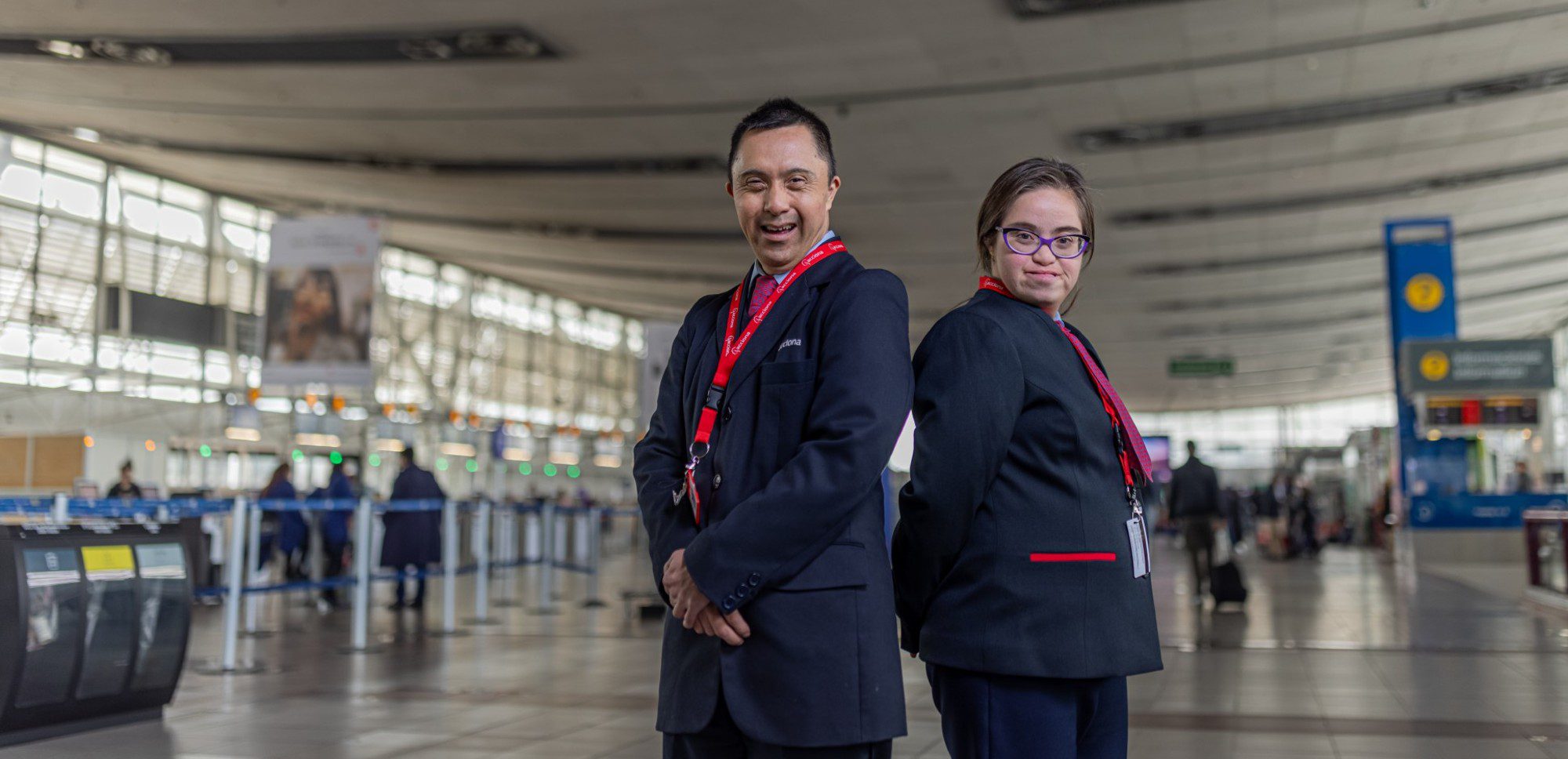“Ernesto,” “Jared,” “Eddy,” “Diego,” “Miss Jessica,” “Byron,” “Claudia,” “Sandra,” “Migue”… These names came up repeatedly in our conversations with Danny and Evelyn. These are the names of their colleagues at ACCIONA, people they have come to know through their work as lobby agents at the airport and more recently, through supporting the Human Resources department at the company’s headquarters in Santiago de Chile. Danny and Evelyn speak of them with great affection, part of the emotional and professional tapestry they have woven over these years. In that time, they have overcome significant professional challenges, a pandemic, and, most importantly, many prejudices.
Our first conversation with them took place on World Down Syndrome Day, a date that, like other calendar celebrations, sometimes remains a mere gesture. However, both embody this commitment daily, demonstrating the human richness and talent they can bring to an organization. This article, based on several conversations with them and the participation of Víctor Andrés Silva, their Human Resources manager, is a way to get to know them more closely.
A real-world experience
“We started in 2019, that’s when we were here,” recalls Evelyn, the more extroverted of the two, when talking about their beginnings at ACCIONA. “Did you come with fear, with any doubts?” Víctor asks them. “I never feel fear, not even if there’s an earthquake, well, maybe a little fear,” adds Evelyn. “I wasn’t afraid,” says Danny. “And even less me,” Evelyn stresses.
She and her colleague started working under a contract with JetSmart airline at the Santiago de Chile airport. From the beginning, the Human Resources department was clear that a public-facing job was ideal. “It creates a lot of independence and autonomy; it’s not a job where they’re stuck by my side all day,” Víctor points out. The goal was for them to be present in the company but also in society.
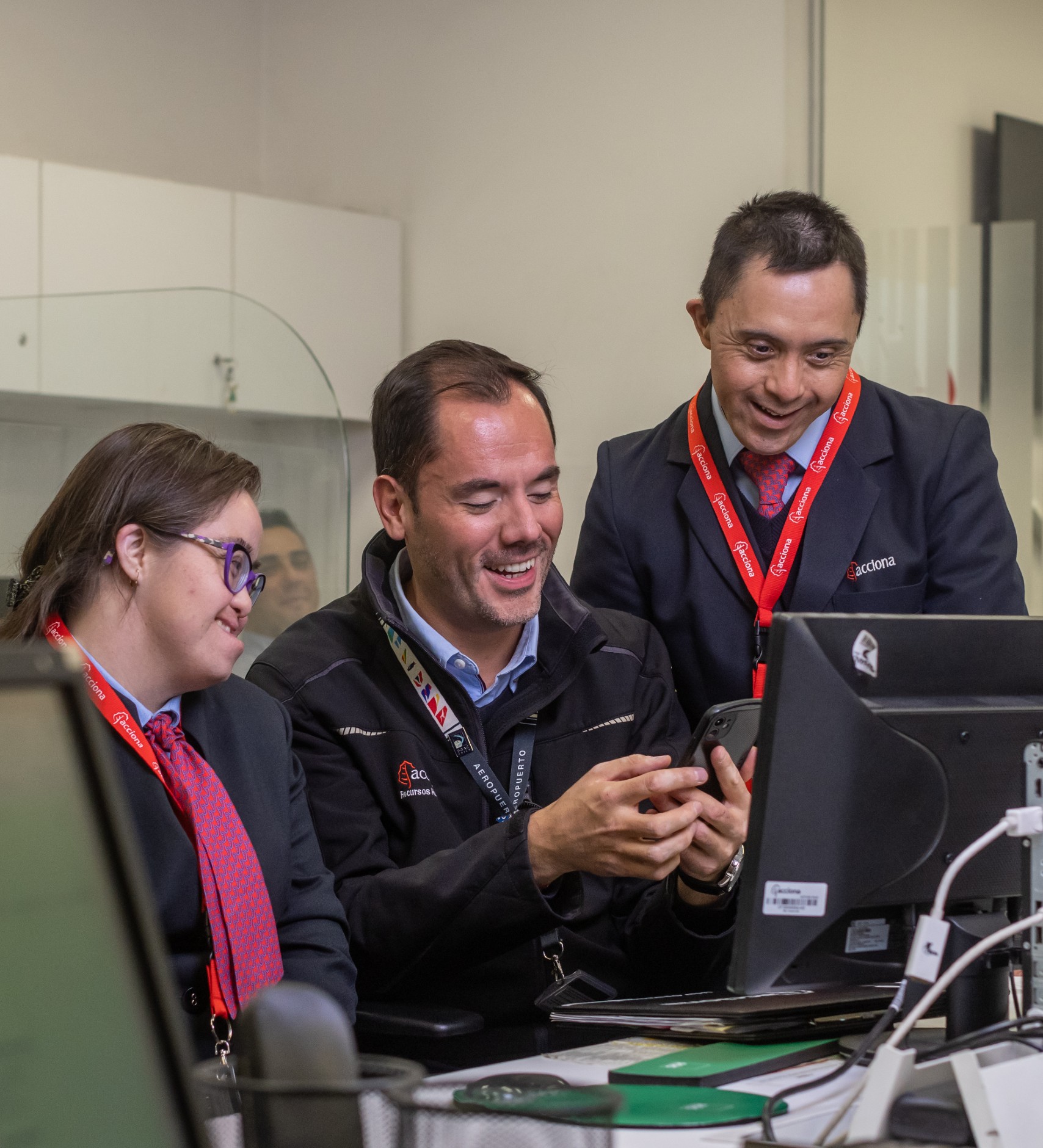
“I was there attending to people, where they were traveling to…,” Evelyn tells us, adding, “Some pass [through the lines] one by one, others in groups of three or four.” “I assist passengers, where they are going… I act as a passenger assistant,” Danny chimes in. “Helping a lady with a wheelchair who can’t walk… They travel to Lima, Colombia, Argentina…,” specifies his colleague.
They recount their initial tasks, organizing passengers in various lines and providing necessary explanations about the boarding gates for each flight and destination. They talk about kind passengers but also some “angry” ones. In short, the real world, with its stressful situations and daily challenges.
“I assist passengers, where they are going… I act as a passenger assistant.” (Danny)
“I love Scarlett a lot,” says Evelyn when talking about one of their planning supervisors, responsible for preparing their schedules with flight data. Working with neurodiversity requires finding new ways to achieve the same goal. One example is the approach adopted to enable Danny to perform his duties despite not being able to read. “We had to adapt a schedule for the flights we had, but visually. For example, a plane was going to Calama, and we explained what Calama was. So, when someone told him they were going to Calama, he would look at his sheet and say: ‘At 3:15’,” Víctor points out. And so, through drawings, Danny was able to fulfill his daily work.
The beginning of it all
Before we continue, a retrospective look. Both Evelyn and Danny grew up in loving families, accustomed to helping at home. “I get along well with my mom, I love her a lot… At home, I’m good at sweeping, folding clothes. Cooking, no,” clarifies Evelyn, who grew up in the Maipú neighborhood in Santiago, although she also often travels to the city of Chillán, where they have a house in the countryside, “to visit some of my aunts. We go walking, looking at things…”. “I don’t sweep; it tires me. I make the bed, dry the dishes, set the table for lunch, the utensils, the spoons, forks, knives, plates… And I like music, I love dancing,” Danny adds. “It seems Evelyn got you into dancing,” Víctor points out.
Suddenly, the conversation, driven by enthusiasm, shifts to Evelyn’s favorite singers: “I also dance at home. I dance all afternoon! I put on Sebastián Yatra, Karol G, yes, I put on Princess Aroa… I also go to Zumba, with all my Zumba classmates.” “I also do Zumba,” Danny tells her. “Danny dances anything with Rodrigo Díaz,” Evelyn interrupts, referring to a well-known dance teacher at the academy they attend in their free time.
“I also dance at home. I dance all afternoon!” (Evelyn)
But back to the professional world, both had previous work experiences. Evelyn balanced her job with her school studies: “I worked at Ciel de París in Portal Ñuñoa [a shopping center in Santiago], organizing clothes, folding pants, blue jeans, those things. I went with my schoolmates.” For his part, Danny is categorical: “I didn’t like school. I like to work.” He explains that he worked at a shoe store, but his colleagues didn’t treat him well.
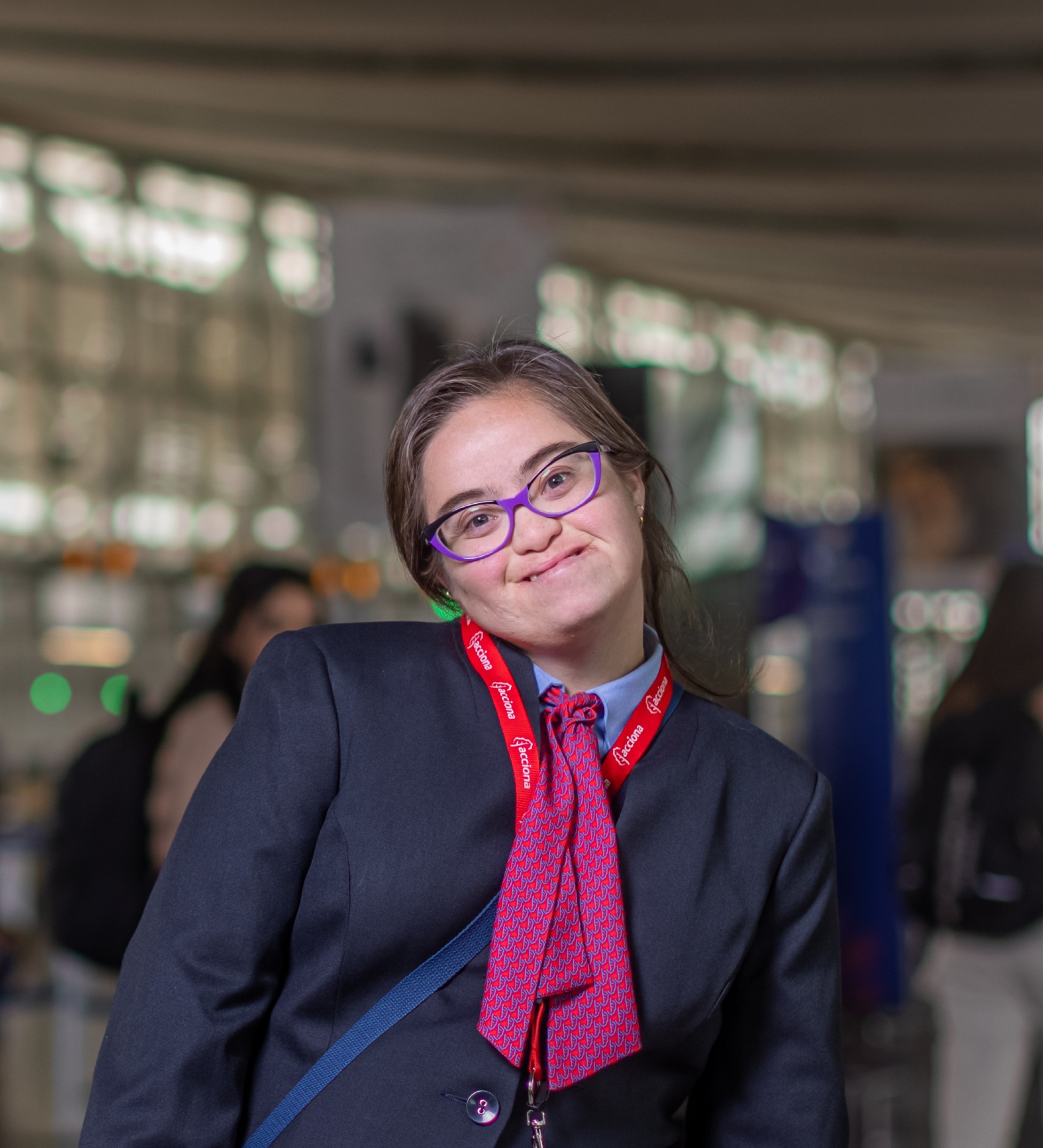
Despite the joy they exude in their conversation, sometimes dark clouds appear, fragments of insensitivity they have faced in their professional environment. It’s inevitable to think that Chilean society, like many others, is undergoing a learning process, normalizing the presence of people like Danny and Evelyn in all spheres of life. But let’s return to their current situation. “I love being here; I feel comfortable here,” Evelyn chimes in with her characteristic loquacity.
New voices within the company
This “here” is a new stage at ACCIONA. After the contract with JetSmart and their work at the airport ended, the options for Danny and Evelyn’s continued employment became complicated. “We spoke with different international airlines we work with to see the possibility of doing the same, of achieving it for them, but the process has been delayed a bit,” Víctor explains. But no, that couldn’t be the end of the road. “So I said: we won’t delay it any longer. Let’s go work in Human Resources with them, find tasks, make a responsibility log. They are 100% capable of doing many things like that,” he adds. And the results have been immediate.
“I like the job here more than at the airport… Setting up chairs, helping with vouchers…,” Danny points out. “Of course, you’re the king of the vouchers!” Víctor tells him. In their new role, Danny and Evelyn have gone from being the visible face to passengers to being the voice of the company among employees.
They now distribute meal vouchers, provide information, deliver Christmas and Easter gifts, and act as a liaison between the Human Resources department and staff. “We have a large terrace downstairs; they interact with forty or fifty people among the workers, and they like that a lot. They go home with a lot of energy,” Víctor comments.

“We have a large terrace; [Danny and Evelyn] interact with forty or fifty people among the workers, and they like that a lot. They go home with a lot of energy.” (Víctor)
And what’s their favorite moment at work? “I like it here, really, when we organize things, the chairs…,” she explains. “Of course, you guys are super organized,” Víctor agrees. Besides setting up furniture, they help organize office supplies, the photocopier, and other daily tasks.
Danny, in turn, comments: “I like the break, I drink water, eat cookies or juices…”. But of course, not everything is rosy; they also have their disagreements. “Look, Danny and I used to fight at the airport. Danny gets mad at me…,” says Evelyn candidly. “I wasn’t mad!” he responds. “Danny makes me nervous, and I can’t help people!” Evelyn continues, and Danny bursts out laughing.
Despite these small daily disagreements, Víctor emphasizes the importance of the synergy between them and tells them: “You’ve been working together for a long time… You’ve gotten used to each other, you’re a team, and you realize that together you enhance each other and provide tremendous value, tremendous help.”
“[Danny and Evelyn] are already a team… They enhance each other and provide tremendous value, tremendous help.” (Víctor)
It’s hard to convey all the affection and connection that fills the conversations between Evelyn, Danny, and Víctor. Both among themselves and towards other colleagues who aren’t present. “I’m well accompanied here. Some people care about me… I care about everyone, I care about all. I love you, Víctor, with much affection. I will always care about you, Mailén, and I care a lot about Camela Muñoz too,” says Evelyn, piling up names one after another. “I care about you a lot too,” Víctor tells her. “And Pablo too,” Evelyn concludes to leave no one out.
Sharing much more than work
In the end, these years together have meant forging bonds in a way that transcends the work environment. Víctor mentions a memorable moment he experienced with both of them: “Do you remember when you invited me to your birthday, Danny? How did you feel?” “Ah, when you arrived? It touched my heart; I felt happy, content, smiling,” he replies. “I also went to Danny’s birthday!” Evelyn interjects and continues: “He also invited the guys from the airport.” Danny counts: “I invited Toño, Nicole, Evelyn…”
“[When you came to my birthday] I felt happy, content, smiling.” (Danny)
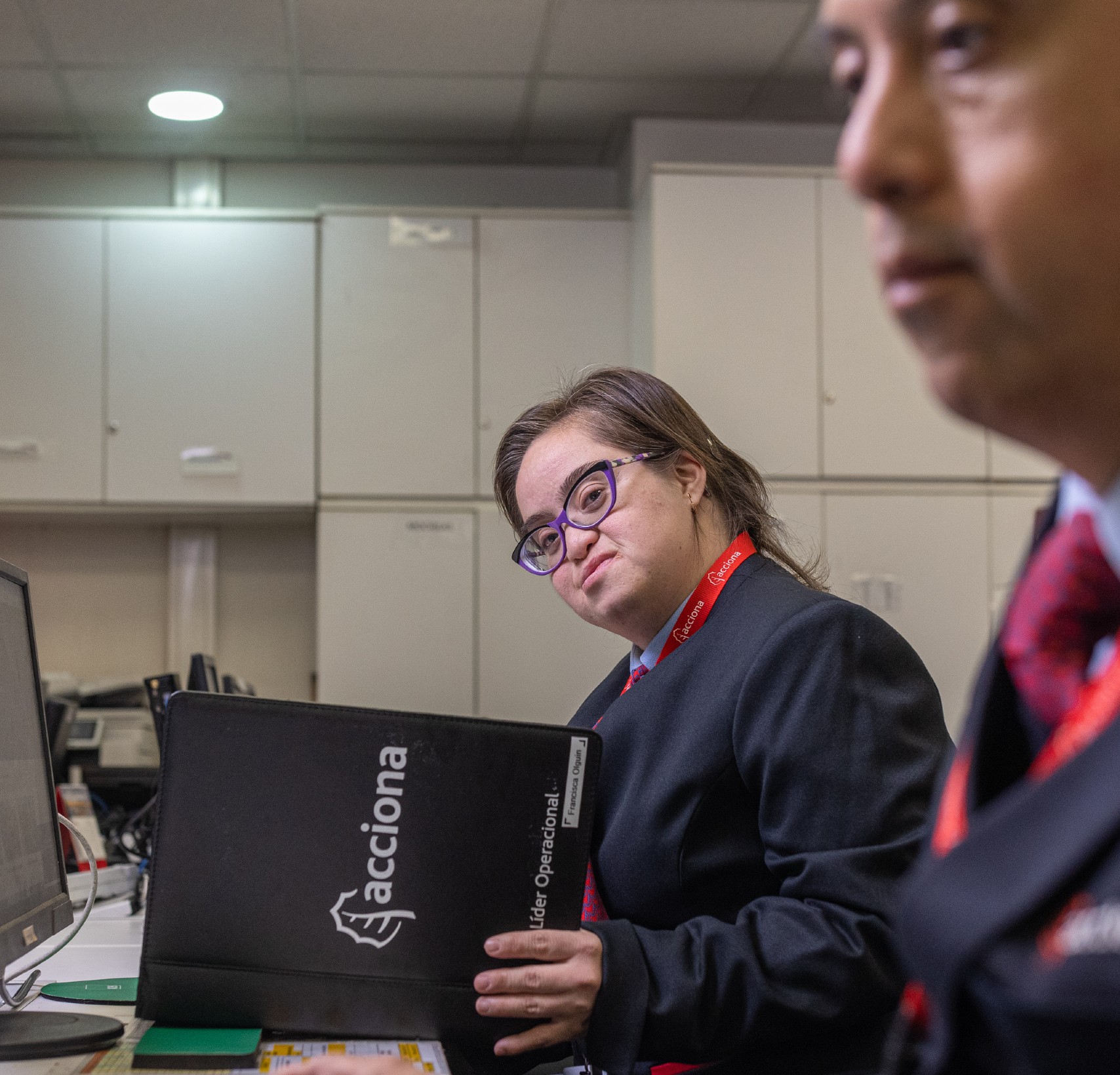
“I had a great time; I danced; but there was only cumbia,” Evelyn complains, preferring reggaeton. “Danny is more into cumbia!” Víctor exclaims, laughing. “My mom was also taking photos,” she recalls. That birthday was also an opportunity to share experiences and impressions between ACCIONA colleagues and families. The families have been witnessing the personal and professional growth of the protagonists of this article over the past few years.
The importance of family support
The challenge of entering the workforce for people like Danny and Evelyn is not only theirs. There are understandable uncertainties and fears among family members. Could their children manage a public job in a large and exposed place like an airport? In the end, they all took that leap of faith, and time has proven them right.
Víctor sums up how they have also strengthened ties with the families: “When we had a big birthday celebration [at the office], I also invited a parent to see where all the kids worked. This was about a year into working, and he met the team… Now they know the work their children do; they know how important the kids are and the leading role they have daily.”
In the end, that trust has strengthened so much that Danny’s mother often sends Víctor urritas, a typical Chilean dish, to the office. Danny also gave him a Japanese lucky cat, one of those that waves its arm, “to protect him.” This inevitably leads us to the next point.
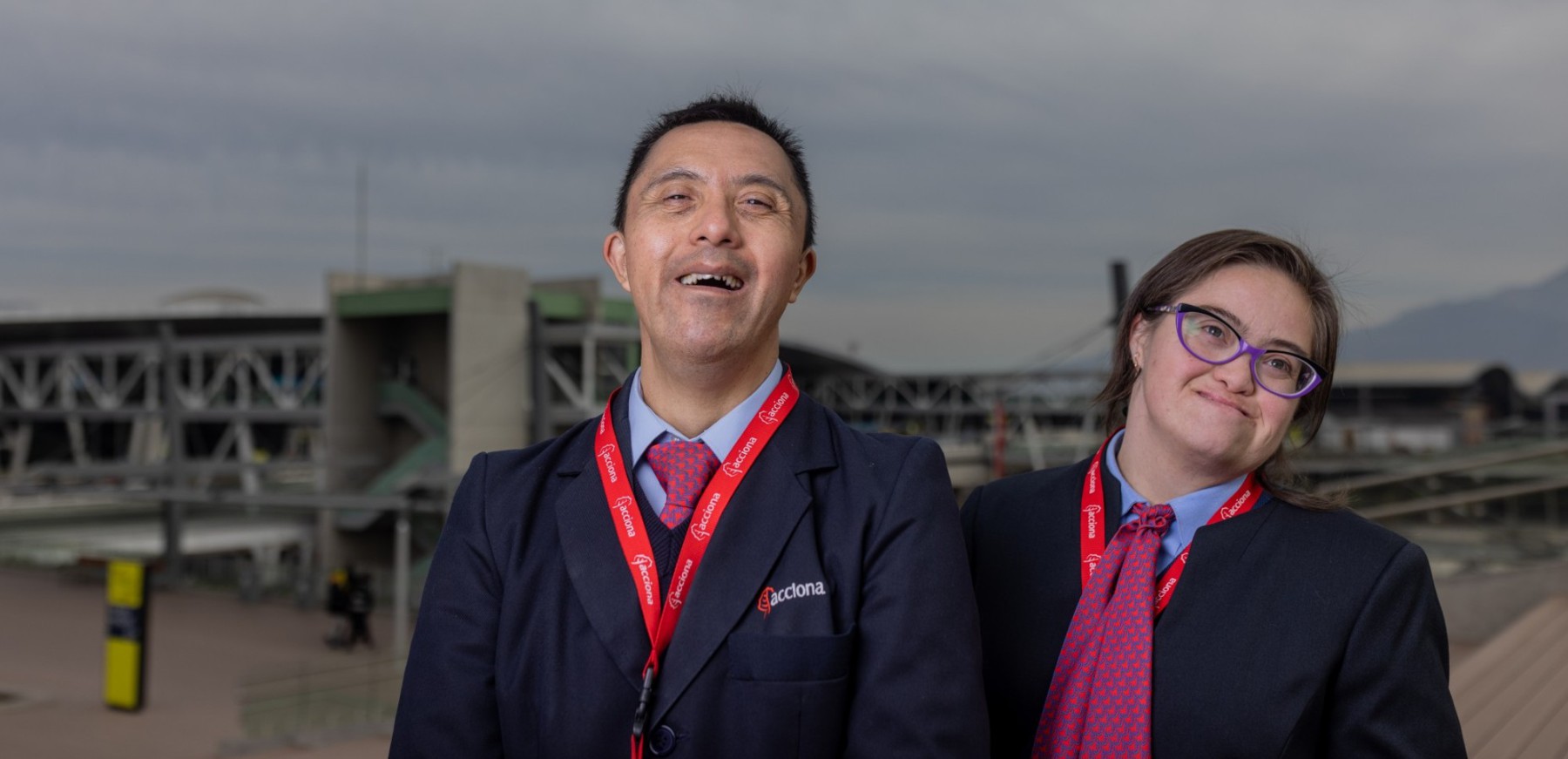
“With my salary”
The affection and trust forged over these years are one of the benefits of their work, but equally important is having a salary that allows them to contribute to their families and have resources for their personal expenses and gifts like the lucky cat mentioned.
“I buy pants, shirts, pajamas… I have a card… I buy a lot of things,” Danny explains when we ask what he spends his money on; he also bought a GPS watch that allows his parents to locate him. “With my salary,” he emphasizes. Beyond the purchase of these material goods, it is evident that this salary has helped them be aware of their own worth.
The road ahead
Before concluding the interview process, Víctor summarizes these years of shared experience with these words of gratitude: “I want to thank you for always being willing to help. I want to thank you for the time you spend with me. I feel that you’ve had significant growth with us, that you’ve learned and grown with us too. That’s why we did this interview, so you can be known because you’ve been with us for a long time. You are an important part of the company, and if the company wants to highlight you, I’m proud of that.”
“You’ve had significant growth with us… That’s why we did this interview, so you can be known.” (Víctor)
As for the future, there are plans for them to return to working at the airport, balancing customer service with their current duties in the corporate building, once morning flight operations resume. However, whether working at the airport or ACCIONA offices, it is undeniable that Danny and Evelyn will continue to bring their enthusiasm and commitment , and taking home all the energy and experiences that the working world brings them.
Perhaps the best summary of all this, the clearest and simplest, comes from Danny, referring to the break they had during the pandemic when they had to temporarily stop working at the airport: “I like to work. I don’t want to stay at home; I get bored.”
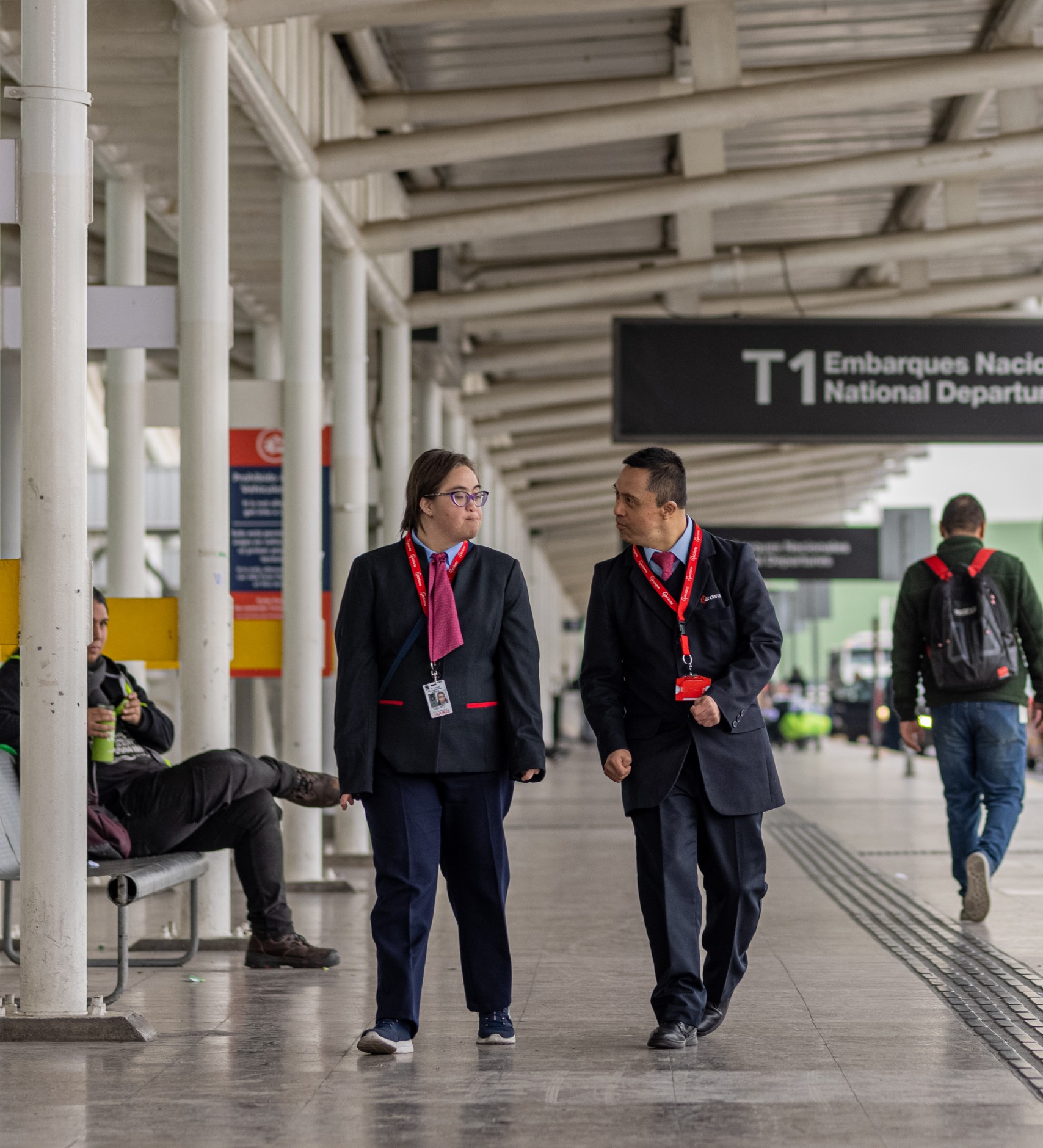
At ACCIONA we need the best professionals on our team, people who choose to invest their talent in generating a positive impact on the planet. Want to sign up for this commitment?


